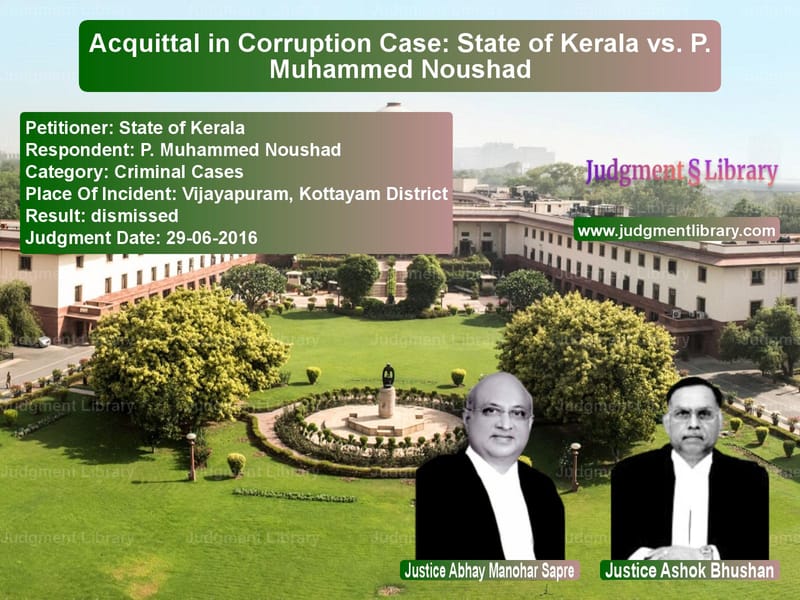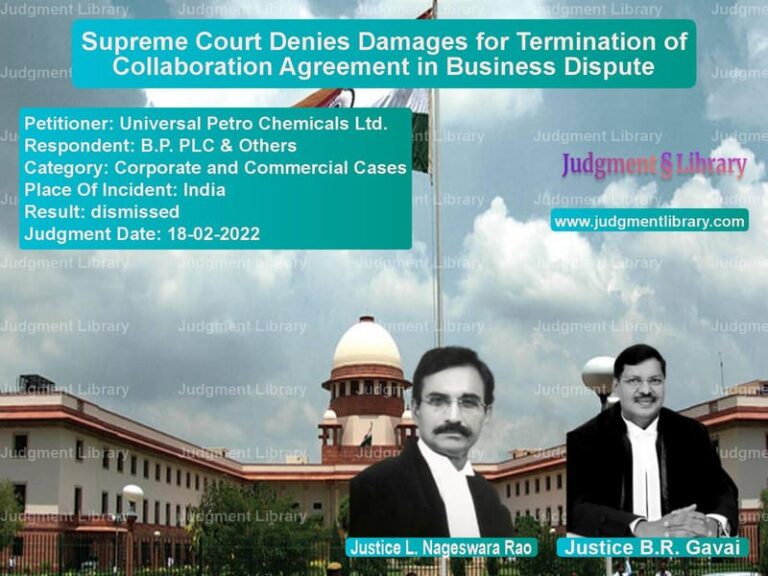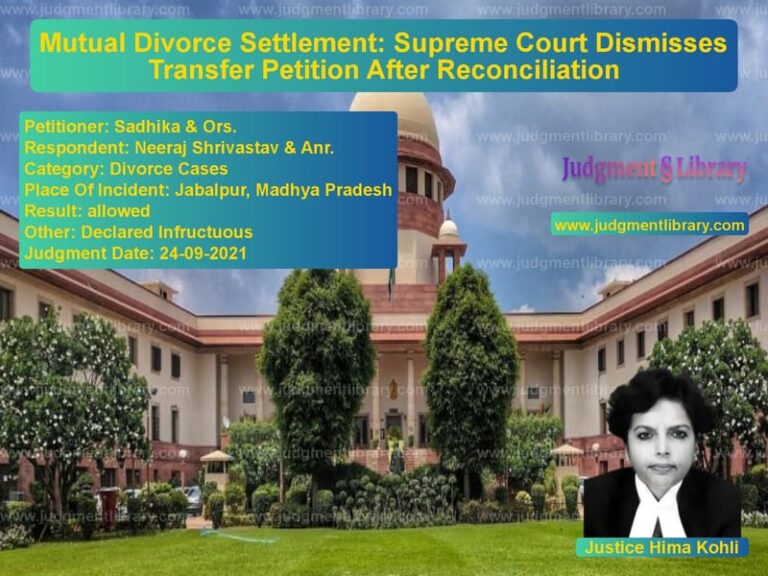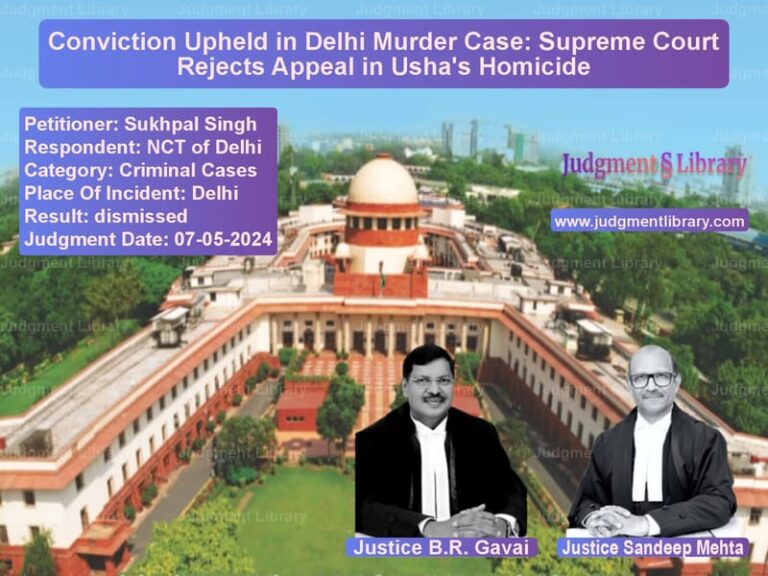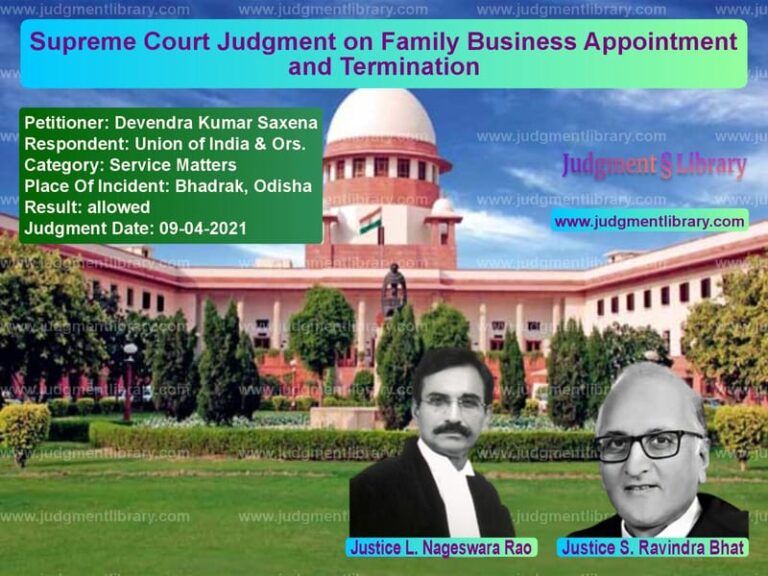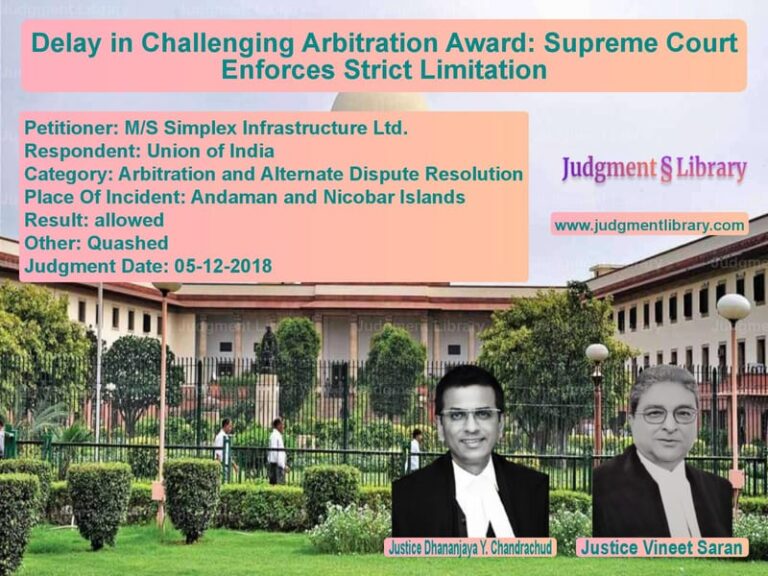Acquittal in Corruption Case: State of Kerala vs. P. Muhammed Noushad
The case of State of Kerala vs. P. Muhammed Noushad is a significant ruling related to corruption charges under the Prevention of Corruption Act, 1988. The Supreme Court of India upheld the acquittal of the accused, highlighting key legal principles regarding the burden of proof in corruption cases.
The accused, P. Muhammed Noushad, was a Village Officer in Vijayapuram, Kottayam District. He was alleged to have demanded a bribe in connection with a property dispute. The trial court convicted him under Sections 7 and 13(1)(d) read with 13(2) of the Prevention of Corruption Act, sentencing him to rigorous imprisonment. However, the Kerala High Court overturned the conviction, citing lack of conclusive evidence regarding the alleged bribe demand and receipt. The Supreme Court, in its judgment, affirmed the High Court’s decision.
Background of the Case
The case originated from a property dispute between the complainant (PW-2) and his sister-in-law. On September 1, 1998, the sister-in-law lodged a complaint with the District Collector. The Collector directed the accused, the Village Officer, to conduct an inquiry and submit a report.
According to the prosecution, on September 10, 1998, the accused demanded a bribe of Rs. 500 from the complainant to prepare a favorable report. The complainant allegedly paid Rs. 300 that day, with a balance of Rs. 200 to be paid later. On September 19, 1998, the accused again demanded the balance amount.
Key Legal Issues
- Whether the accused had indeed demanded and accepted a bribe.
- Whether the prosecution had presented conclusive evidence to establish guilt beyond a reasonable doubt.
- The validity of the High Court’s decision to overturn the trial court’s conviction.
- The standard of proof required in corruption cases under the Prevention of Corruption Act.
Arguments by the Parties
Prosecution’s (State of Kerala) Arguments
- The accused had explicitly demanded and accepted a bribe from the complainant.
- A trap was set up by vigilance officials, and phenolphthalein powder was used to mark the bribe money.
- Independent witnesses were present during the trap operation.
- The complainant immediately signaled to the vigilance team after handing over the bribe.
- The accused was caught red-handed with the bribe money in his pocket.
Defense’s (P. Muhammed Noushad) Arguments
- The prosecution failed to establish that the accused had demanded a bribe.
- The source of the money in his pocket was not proven to be illicit.
- The phenolphthalein test did not yield conclusive results, as the currency notes did not turn pink.
- The complainant had personal grievances against the accused, raising the possibility of a false implication.
Trial Court’s Decision
The trial court found the accused guilty under:
- Section 7 of the Prevention of Corruption Act – Public servant taking gratification other than legal remuneration.
- Section 13(1)(d) read with 13(2) of the Prevention of Corruption Act – Criminal misconduct by a public servant.
The accused was sentenced to three years of rigorous imprisonment under Section 7 and four years of rigorous imprisonment under Section 13(1)(d), along with a fine of Rs. 25,000.
High Court’s Ruling
The accused appealed before the Kerala High Court, which overturned the trial court’s ruling. The High Court’s key observations were:
- The prosecution had failed to conclusively establish how the currency notes reached the accused’s pocket.
- The phenolphthalein test did not yield positive results, meaning the currency notes did not turn pink.
- There was a lack of direct evidence proving the demand for a bribe.
- Benefit of doubt should be given to the accused when key aspects of the prosecution’s case are unproven.
Supreme Court’s Judgment
The Supreme Court upheld the High Court’s acquittal, emphasizing the importance of strict evidentiary standards in corruption cases. The Court ruled:
“It is a settled principle of law that if the view taken by the High Court while reversing the judgment of the Trial Court appears to be just and reasonable and is supported by cogent reasoning, then this Court would not re-appreciate the evidence again, especially when the appeal arises out of the order of acquittal.”
Key Observations by the Court
- The prosecution must prove both demand and acceptance of a bribe beyond reasonable doubt.
- The High Court’s view was a plausible and reasonable interpretation of the evidence.
- The failure of the phenolphthalein test weakened the prosecution’s case.
- There was no compelling reason to interfere with the High Court’s findings.
Final Judgment
The Supreme Court dismissed the appeal, affirming the High Court’s decision to acquit the accused. It concluded that the prosecution had failed to meet the burden of proof required for a corruption conviction.
Conclusion and Legal Impact
This ruling reinforces several key legal principles:
- Bribery charges require both demand and acceptance to be proven beyond reasonable doubt.
- The failure of forensic evidence (such as a phenolphthalein test) can weaken the prosecution’s case.
- Acquittal orders are given greater deference than conviction orders in appellate review.
- Courts must ensure that no individual is convicted based on weak or speculative evidence.
The Supreme Court’s decision highlights the necessity of strong, unambiguous evidence in corruption cases and ensures that judicial scrutiny remains stringent in matters involving criminal misconduct allegations.
Judgment delivered by: Abhay Manohar Sapre, Ashok Bhushan
Judgment Date: June 29, 2016
The ruling serves as a reminder that while tackling corruption is essential, it must be done through legally sound and well-substantiated prosecutions.
Don’t miss out on the full details! Download the complete judgment in PDF format below and gain valuable insights instantly!
Download Judgment: State of Kerala vs P. Muhammed Noushad Supreme Court of India Judgment Dated 29-06-2016-1741872434113.pdf
Direct Downlaod Judgment: Direct downlaod this Judgment
See all petitions in Fraud and Forgery
See all petitions in Bail and Anticipatory Bail
See all petitions in Public Sector Employees
See all petitions in Judgment by Abhay Manohar Sapre
See all petitions in Judgment by Ashok Bhushan
See all petitions in dismissed
See all petitions in supreme court of India judgments June 2016
See all petitions in 2016 judgments
See all posts in Criminal Cases Category
See all allowed petitions in Criminal Cases Category
See all Dismissed petitions in Criminal Cases Category
See all partially allowed petitions in Criminal Cases Category

